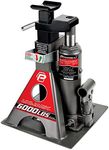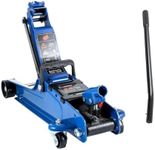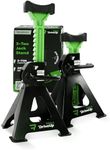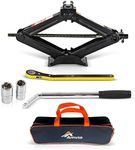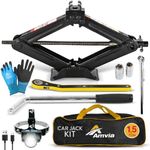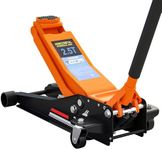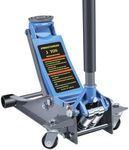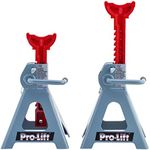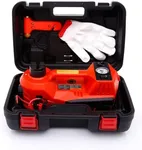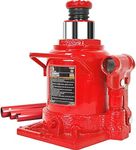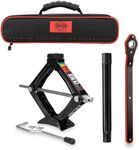Buying Guide for the Best Car Jacks
When it comes to buying a car jack, it's essential to consider the type of vehicle you have and the tasks you plan to perform. Car jacks are crucial tools for lifting vehicles to perform maintenance or repairs, so choosing the right one ensures safety and efficiency. Understanding the different types of car jacks and their specifications will help you make an informed decision that suits your needs.Type of Car JackCar jacks come in various types, including scissor jacks, bottle jacks, and floor jacks. The type of jack you choose depends on your vehicle and the kind of work you plan to do. Scissor jacks are compact and often included with vehicles for emergency tire changes. Bottle jacks are more robust and suitable for heavier vehicles, while floor jacks offer stability and ease of use for frequent maintenance tasks. Consider the type of vehicle you have and how often you'll use the jack to determine the best type for you.
Lifting CapacityLifting capacity refers to the maximum weight a car jack can safely lift. This is crucial because using a jack with insufficient capacity can be dangerous. Lifting capacities are usually measured in tons, with common options being 1.5, 2, 3 tons, and more. To choose the right capacity, check your vehicle's weight, which can be found in the owner's manual or on the vehicle's information sticker. Always select a jack with a capacity that exceeds your vehicle's weight to ensure safety.
Lifting RangeThe lifting range of a car jack indicates how high it can lift a vehicle. This is important for ensuring that the jack can raise your vehicle high enough for the intended maintenance or repair work. Lifting ranges vary, with some jacks offering a minimum lift of a few inches and a maximum lift of over a foot. Consider the ground clearance of your vehicle and the height needed for your tasks. If you have a low-profile vehicle, ensure the jack can fit under it and lift it to the required height.
Material and Build QualityThe material and build quality of a car jack affect its durability and reliability. Jacks are typically made from steel or aluminum, with steel being more durable and aluminum being lighter and easier to handle. High-quality jacks often have reinforced frames and sturdy construction to withstand regular use. When choosing a jack, consider how often you'll use it and the conditions it will be exposed to. A well-built jack will last longer and provide safer operation.
PortabilityPortability is an important factor if you need to transport the jack frequently or use it in different locations. Scissor jacks are generally more portable due to their compact size, while floor jacks can be heavier and bulkier. If you need a jack for emergency roadside use, a lightweight and compact option is ideal. For garage use, portability might be less of a concern, allowing you to opt for a more robust model.
Ease of UseEase of use refers to how simple and straightforward it is to operate the car jack. Some jacks come with features like quick-lift mechanisms or swivel casters for easier positioning. Consider your physical strength and experience with using car jacks. If you're new to using jacks or prefer a hassle-free experience, look for models with user-friendly features that make the lifting process smoother and more efficient.
